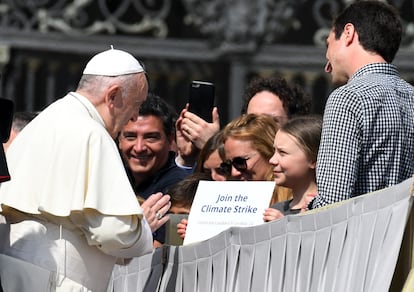Francis, the pontiff who embraced scientific evidence on climate change and put the environment at the center
His first encyclical, in 2015, helped launch the Paris Agreement. In 2023, he updated it to scold countries for not weaning themselves off fossil fuels


From the very first moment, when he announced the name he had chosen for his papacy, Jorge Mario Bergoglio linked his work as head of the Catholic Church to the environment and the defense of humanity’s “common home,” planet Earth. Pope Francis chose the name because of Francis of Assisi, the patron saint of the environment for the Catholic Church, as well as a symbol of poverty. His first encyclical, in June 2015, was titled Laudato si — also taken from a hymn by Saint Francis of Assisi. That text was entirely focused on the environment and the fight against global warming. The text cast aside any climate denialism and arrived in a key context: just months before the United Nations summit at which the Paris Agreement was to be finalized.
In 2023, through an apostolic exhortation, the Pope updated that encyclical to, among other things, scold governments for not replacing fossil fuels responsible for the “climate crisis” with renewable energy at the necessary speed. In his autobiography, which came out in mid-January, he spoke again of the “climate emergency.” He added: “Our common home asks us to pause in our way of life, which pushes the planet beyond its limits and causes soil erosion, the disappearance of fields, the advance of deserts, the acidification of the seas, and the intensification of storms and other intense climate phenomena.” That’s exactly what science tells us, point by point, comma by comma: we are behind schedule, and extreme events are becoming more severe and frequent.
Francis was, without a doubt, the pope who embraced scientific evidence on climate change and led the Catholic Church to take a stand on such a strategic issue, one that ultraconservative and denialist populism has targeted with hoaxes and lies. Teresa Ribera, vice president of the European Commission and an international benchmark for climate diplomacy in recent decades, recalls that Bergoglio was “enormously respected for his social commitment” when he became pontiff. But “he immediately understood and embraced environmental protection as a central axis of peace and justice among humanity.” “His Laudato si, perhaps the most important ecumenical product of his papacy, marked a before and after in global climate action. Half jokingly, half seriously, he recalled: ‘God always forgives, men sometimes, and nature never,’” Ribera recalls.
That encyclical dismantled denialism and joined the pronouncements that other religious leaders had made in 2015 to pressure the signing of the grand pact against climate change, which finally happened on December 12 in the French capital. However, none of the other leaders’ pronouncements had the depth of the papal encyclical.
For Manuel Pulgar, Peru’s Minister of the Environment from 2011 to 2016 and another authoritative voice in climate diplomacy, the text represented “a very timely contribution by Pope Francis and the Holy See to the process that led that same year to the adoption of the Sustainable Development Goals in September and, months later, in December, to the Paris Agreement.” “It defined an unprecedented role for the highest hierarchy of the Catholic Church in the multilateral debate on environmental issues,” adds Pulgar, who believes the encyclical was “a positive political signal” that, combined with others, such as the joint declaration by China and the U.S., “created the appropriate atmosphere for achieving the goal of reaching an agreement in Paris.”
“With Laudato si, he managed to reach so many people around the world and mobilize them at a very important moment when we were negotiating the Paris Agreement,” recalls Sara Aagesen, Spain’s Minister for Ecological Transition. Aagesen also participated in those negotiations at the summit held in the French capital.
The diplomat and politician Laurence Tubiana is considered one of the architects of the Paris Agreement. She highlights Bergoglio’s promotion of “a humanist vision of the global management of the commons.” Like her colleagues, she emphasizes the value of the 2015 encyclical as “a foundational text of the Christian commitment to climate action, which has inspired and shaped a new generation of committed people. By clearly exposing the causes of the crisis we are experiencing, Pope Francis reminded us to whom the fight against the climate crisis is directed: humanity as a whole.”
But the encyclical wasn’t an isolated text in his papacy, because the environment and climate change struggle were present throughout his tenure. For example, when he had a public meeting in St. Peter’s Square at the Vatican in 2019 with Swedish activist Greta Thunberg, the great symbol of the fight against global warming at the time and the target of fierce attacks from denialists and conservative sectors. “Keep going,” the pontiff encouraged her. Then, in 2022, the Vatican finally ratified the Paris Agreement. And a year later, he attempted to participate in the climate summit held at the end of 2023 in Dubai, although health problems ultimately prevented him from doing so.
Green Speech by the Pope
During Bergoglio’s 12-year papacy, climate change has accelerated, and scientific evidence that this human-caused warming is also behind the intensification of extreme weather events has become more solid. Unlike other social issues where the Church moves very slowly or not at all, the pontiff’s “green” rhetoric has evolved at the pace set by science and activism. If in the 2015 encyclical he spoke of “climate change,” in the 2023 update he alluded to the “climate crisis,” and in his autobiography he used “climate emergency” to refer to this problem.
The exhortation in which he spoke of the climate crisis — Laudate Deum (2023) — fits well into this evolution of Bergoglio’s environmental discourse throughout his papacy. Although he defended “multilateralism,” he harshly criticized recent climate summits. “Today we can continue to affirm that the agreements have had a low level of implementation because adequate mechanisms for control, periodic review, and sanctioning non-compliance were not established,” he maintained. Furthermore, he criticized the blocking attitude of some nations: “International negotiations cannot make significant progress because of the positions of countries that prioritize their national interests over the global common good.”
Manuel Pulgar highlights the Pope’s proposal to reconfigure multilateralism by generating “a new procedure for decision-making and legitimizing those decisions.” This is because he was proposing something that is currently “discussed in various forums, and that is to achieve a kind of greater democratization in the multilateral process.” “Both documents, Laudato si and Laudato Deum, represent a new perspective by the Catholic Church on the new challenges facing humanity,” Pulgar emphasizes. However, he criticizes the limited “dissemination” of these writings by the Church itself. “The Church would promote real change if it could convert these texts into simpler catechetical texts that would reach a mass audience of different ages,” he opines.
Sign up for our weekly newsletter to get more English-language news coverage from EL PAÍS USA Edition
Tu suscripción se está usando en otro dispositivo
¿Quieres añadir otro usuario a tu suscripción?
Si continúas leyendo en este dispositivo, no se podrá leer en el otro.
FlechaTu suscripción se está usando en otro dispositivo y solo puedes acceder a EL PAÍS desde un dispositivo a la vez.
Si quieres compartir tu cuenta, cambia tu suscripción a la modalidad Premium, así podrás añadir otro usuario. Cada uno accederá con su propia cuenta de email, lo que os permitirá personalizar vuestra experiencia en EL PAÍS.
¿Tienes una suscripción de empresa? Accede aquí para contratar más cuentas.
En el caso de no saber quién está usando tu cuenta, te recomendamos cambiar tu contraseña aquí.
Si decides continuar compartiendo tu cuenta, este mensaje se mostrará en tu dispositivo y en el de la otra persona que está usando tu cuenta de forma indefinida, afectando a tu experiencia de lectura. Puedes consultar aquí los términos y condiciones de la suscripción digital.








































